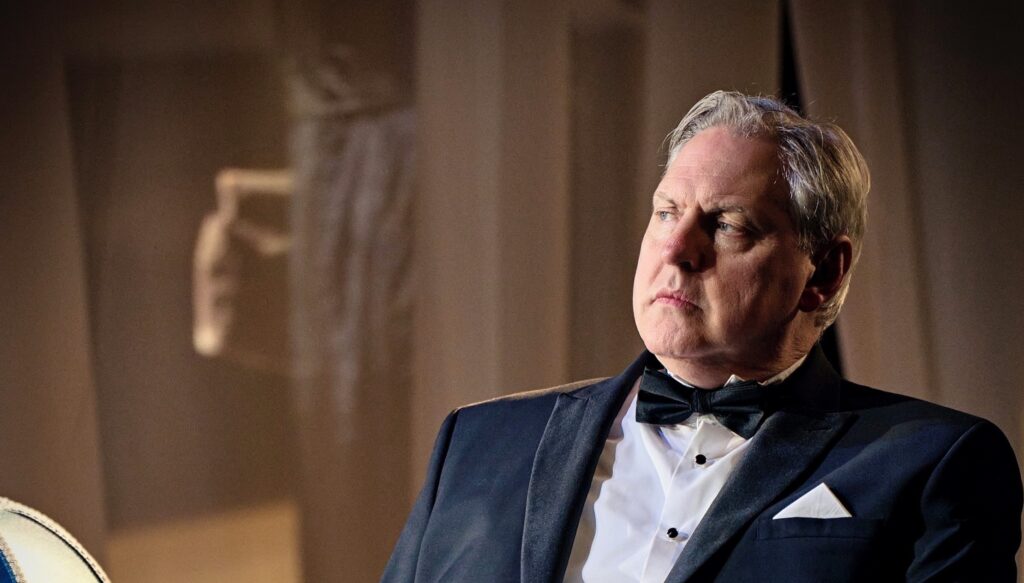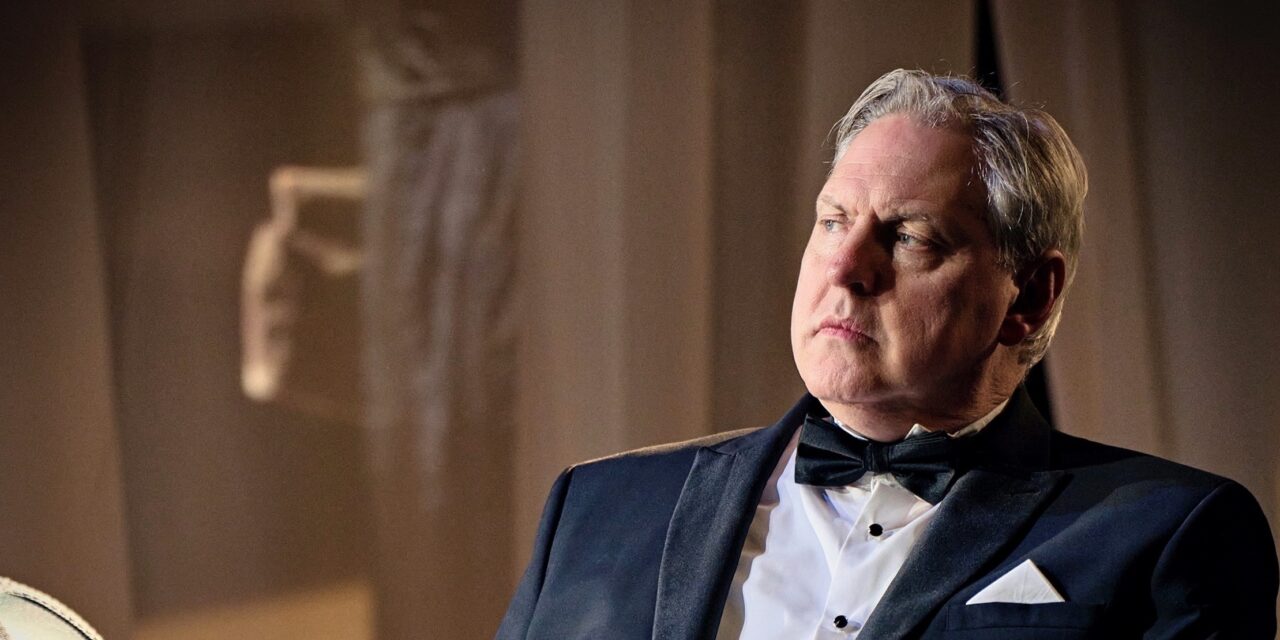
Bob Barrett, well known to TV audiences as Sacha Levy in Holby City, is set to star in And Then There Were None at the Theatre Royal Bath this month. He tells us why the author Agatha Christie has a special place in his heart and which key ingredient helped to make this story the bestselling novel of all time.
For people who are new to And Then There Were None, what is it all about?
I can’t say too much because I don’t want to give the game away but basically the premise is that ten people have been invited to Soldier Island, near Devon, by Mr and Mrs Owen and they all think they’re there for legitimate reasons. Then, when they turn up, they find out that all is not as it seems. Mr and Mrs Owen are nowhere to be seen and they learn that they are being accused of various different murders that they have supposedly perpetrated.
How would you describe Doctor Armstrong?
He’s a former surgeon who left to become a nerve specialist and he has risen to the top of the tree. He’s a Harley Street surgeon and he’s world-renowned, and as a person he’s a patrician and quite remote, keeping himself to himself. Because of what he’s been accused of in the play, he has trouble with his own nerves, so ironically a man who is an expert in treating nerves is actually a very nervous man himself. He tries to keep it under wraps, to keep it hidden, but it becomes more and more revealed as the play goes on.
What appealed to you about the play?
I played a doctor in Holby City for 12 years, but Doctor Armstrong is a totally different character, and I don’t often get to play characters like this. I tend to play more sympathetic characters. Nobody in the play is a particularly sympathetic character and he certainly isn’t. When you first meet him, you’d think he’s a snob and stuck up, although as the story goes on more and more humanity is revealed in him. Another thing that appealed to me is that I’ve never done an Agatha Christie before and I thought “If you’re gonna do an Agatha Christie, then do it with Lucy Bailey”. You should do anything with Lucy Bailey because she’s an extraordinary director. My wife [Rebecca Charles] had worked with Lucy before and said how amazing she is, so I wanted to work with her and it’s a wonderful experience. I also wanted to work with (production company) Fiery Angel because they’ve got such a great reputation and they’re known to be very friendly and very supportive, and they really are. And I wanted to do it because my mother was a big Agatha Christie fan, who even named her car ‘Agatha’. She died when I was 12 and I worshipped her, so this felt like a nice thing to do for her. And if you’re going to do an Agatha Christie this is the one to do because it’s the jewel in the crown.
The novel is the best-selling crime story of all time. Why do you think that is?
It’s so perfectly constructed, and Lucy has done a brilliant new take on it. Obviously, there are going to be people coming along who are Agatha Christie fans and people of a certain age who’ve lived with this book for a very long time. Then for a younger audience you can cite things like The Hunger Games and there are elements to do with the climate crisis in the play that Lucy has picked up on, which make it very relevant for a modern audience.
Why do you think theatre goers love a good thriller?
I think it’s largely because they’re more invested in a thriller than any other genre because there’s something to solve. In the interval everyone’s going “Well, who do you think it is?” and “I don’t know, who do you think it is?” You could almost have a keypad where people press one for Armstrong, two for Judge Wargrave and three for whoever. We have a mixture of people who’ve read the book, know it backwards and have just come to just watch our take on it with people who’ve never seen it before and don’t know what happens, which is very exciting.
This is your first time on stage since you did A Midsummer Night’s Dream in 2009. How is it being back out there?
I’ve done a couple of smaller theatre things this year but this is my first foray back into big productions and I love it. There’s something special about being in a proper big theatre and there’s something so unique about coming out and doing a play for 800 or 1,000 people. We’re doing the show at some of the best theatres in the country. I missed the sort of flexing of the stage muscle, the excitement and the stretch of it both vocally and physically, so it’s exciting to be doing all that again.
When it comes to TV, is Dr Sacha Levy from Holby City the role people most recognise you for?
It is, yes. Every now and then I get “Oh, you were in Bad Girls” or “You were in this and that and the other”. But pretty much 99.5% of the time it’s Sacha. I’m still amazed by that and I’m so happy with it. It’s such a popular show and I’m very conscious that you only get to do what you do because you have an audience. I wouldn’t have got to do it for 12 years if the audience wasn’t passionate about it and watching it. I’m lucky because I played a nice character. If you played an evil character you might get short shrift but he was a nice guy, so I get a lovely reaction from people about the character. I’m amazed that people still hold it dear to their hearts. I’m very, very touched by that. I don’t do social media so it’s wonderful when they come up to me in person. I just feel very beholden to the audience because they’re what’s kept me in work.
You’ve been working since the early 90s. What have been your other favourite jobs over the years?
I did an episode of Absolutely Fabulous, which was amazing. I loved Holby City, of course, and I’ve really enjoyed doing theatre. I met my wife when I did Cyrano de Bergerac in the West End, so that was a special one. I’ve done a lot of work with the playwright Howard Barker, which I also loved, but I’d have to say the plays I’ve done with the Propeller theatre company are the ones I look back on with such fondness. I had three sisters growing up, but I never had brothers. But I now have 15 brothers who I work with in Propeller. I’ve met so many people who are precious and important to me.
How do you fill your downtime when you manage to get any?
It’s so boring but I just spend it with my family. Well, it’s not boring at all, it’s amazing. I’m very lucky that I have an amazing family. Doing Holby City was so full on that even though I kept in touch with my friends I didn’t see them as much as I would have liked, but they understood that my downtime was solely with my family. I also listen to an enormous amount of music; I’ve got a ridiculously big collection. And I read a lot and I’m a massive sports fan. My father-in-law, who’s 86, has moved in with us after he had a stroke last year. It’s me, my father-in-law, my two daughters, my wife and our dog. We used to pay for Sky Sports for him and now for the first time ever I’ve got Sky Sports in the house, so we can watch it together.
Are there any stops on the tour that are dear to your heart?
My wife adores Bath and I think if there’s anywhere in the country my family would like to move to it’d be Bath. It’s an amazing place but I’ve never spent any proper time there. When I’ve worked in Bath I’ve always been rehearsing another play in London. This time we’re going rent a nice little place there and do some exploring.
Agatha Christie’s And Then There Were None appears at the Theatre Royal Bath from Tuesday 20th to Saturday 24th February. To book tickets contact the Box Office on 01225 448844 or book online at www.theatreroyal.org.uk
Photo credit: Manuel Harlan


